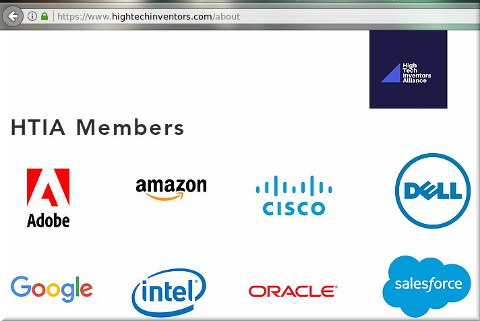Parasitic firms find it harder to troll

Summary: The Patent Trial and Appeal Board (PTAB), which continues to invalidate software patents by the thousands, comes under attack from the expected sites, namely those that are fronting for patent trolls and parasites
THE appeal board/judges at the USPTO are very popular. Everyone loves them. Except parasites with low-quality patents.
The High Tech Investors Alliance, a pro-PTAB group which was created
not too long ago,
explains that having no potent software patents (and other low-quality patents) is a good thing. Here is what the media said some days ago:
The High Tech Investors Alliance has responded to contentions that recent legislation and US Supreme Court decisions, including the Alice Corp v CLS Bank case, have weakened the US patent system.
In an open letter, the association, whose members include Adobe, Amazon, Google and Intel, said that the facts “tell a completely different story”.
“Innovation has thrived—indeed exploded—as measured by ever significant metric. Research and development spending, venture capital investment, startup activity, and patent applications each have increased dramatically, while the US GDP has grown by a healthy 9 percent to the highest level in history,” it explained.
As usual, it's worth checking the response from the patent extremists. Have they got any valid arguments against PTAB? Not really.
IAM continues with its anti-PTAB rhetorics, also in India, typically by speaking to maximalists. Here is
what it wrote some days ago about India’s Intellectual Property Appellate Board:
In the meantime, the upshot for rights holders is that a key part of the patent system simply does not work. Essenese Obhan of Obhan & Associates calls the situation “disastrous” for patent owners, explaining: “All appeals from controller orders remain pending, as a result of which patent owners whose patents were wrongly refused by the patent office are stuck while their patent term slowly expires”. While clients can approach the court on a writ regarding opposition and revocation cases, doing so adds to their cost burden.
As a reminder, IAM keeps lobbying India for software patents. We covered examples earlier this year, for example in:
- China Adopts Software Patents and IAM 'Magazine' (Lobbyists) Continues to Shame India Into It
- IAM Just Can't Stop Pushing for Software Patents in India
- IAM 'Magazine' as Megaphone for Chamber of Corporates (CoC), Which Tries Shaming India Into Software Patenting
- IAM Helps Enemies of India's Interests Lobby for Software Patents in the Country
- IAM 'Magazine' in a Campaign to Destroy India's IT Industry and Help Patent Trolls There
- IAM is a Think Tank for Patent Trolls, Software Patents, the EPO, Microsoft, and Whoever Else is Willing to Pay
- The Patent Microcosm's Failed Push for Software Patents Resurgence in the US and Similar Attempts in India and China
Over at
Managing IP, another site of patent maximalists, Fitzpatrick
was entertained with a so-called 'study' (likely biased because of the firm behind it). To quote:
For the first time, the Patent Trial and Appeal Board has upheld the majority of claims in IPR proceedings for four consecutive quarters, a Fitzpatrick 2016 study reveals
They are trying to promote the illusion that PTAB is getting weaker, probably in an effort to attract more business.
Patently-O, another site of patent maximalists,
said this a few days ago: "Post-AIA patent applications are now trickling up to the PTAB in ex parte appeals from examiner rejections. In the recent decision Ex Parte Kirk, APPEAL 2017-003486, (Patent Tr. & App. Bd. Oct. 26, 2017), the Board affirmed an examiner’s obviousness rejection based upon the combination of a 102(a)(1) reference (an application published prior to Kirk’s effective filing date) and a 102(a)(2) reference (an application published subsequent to Kirk€´s effective filing date, but filed prior to that date). In the appeal, the Board did not expressly consider the propriety of applying 102(a)(2) references to the obviousness analysis. See also, Ex Parte Linkedin Corp., APPEAL 2017-005043 (Patent Tr. & App. Bd. Sept. 25, 2017)."
PTAB is certainly working as hard as ever and is doing the right thing. It also eliminates many software patents. To quote the latest examples, courtesy of the pro-software patents
Patent Buddy:
- PTAB Affirms Examiner's Rejection under 101 in another patent directed to Tracking Technology: https://storage.googleapis.com/pbf-prod/pdfs/2017-12-07_14699105_175209.pdf … [link]
- PTAB Affirms Examiner's Rejection of Correlation Software Patent Application under 101/Alice: https://storage.googleapis.com/pbf-prod/pdfs/2017-12-07_10119995_175211.pdf … [link]
- PTAB Affirms Examiner's Rejection of Peer-to-Peer Claims in an Apple Patent Application under 101/Alice: https://storage.googleapis.com/pbf-prod/pdfs/2017-12-07_12286488_175213.pdf … [link]
The next post, which is about
Alice, will show that software patents are weaker than ever. They're basically being revoked even if they were granted before
Alice. Thanks to PTAB for the most part...
⬆

